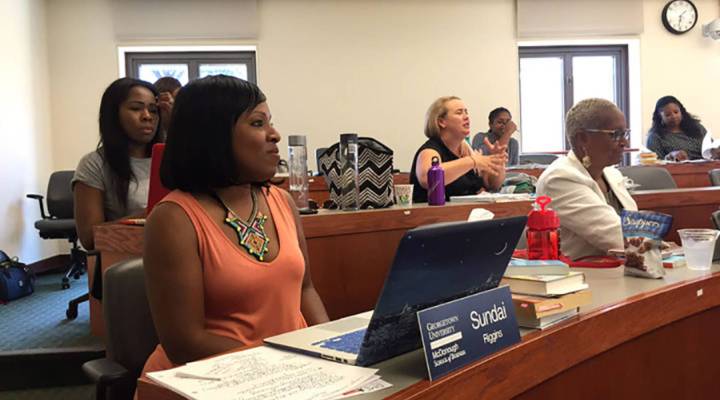
What school principals can learn from CEOs

Eric Bethel was about to deliver some bad news to a tough crowd — a room full of school principals.
“All right, so, team,” he began, “there are some key data points that we need to look at.”
Actually, Bethel was only practicing to give the bad news to an even tougher crowd. In a few days, he’d have to tell his teachers at Turner Elementary School in Washington, D.C., that they’ll have to take turns monitoring the lunch room this year, because of behavior problems.
Bethel is part of an executive masters degree program for principals at Georgetown University. The program, housed in Georgetown’s business school, was created by management professor Bob Bies. Twenty principals — half from traditional D.C. public schools and half from charter schools — come to campus every other weekend for a year. Most principals are trained in education programs that focus on curriculum and teaching methods, Bies said.
“But the reality is they are running organizations,” he said. “It requires staffing, it requires issues around how you manage people, it requires issues about budgets.”
Many of those skills aren’t covered in an educational program, he said.
| The high cost of principal turnover |
| Principals at low-income schools often leave, but this one has stayed 17 years |
Thinking of principals as CEOs is part of a trend in education some teachers and public school advocates find worrying. With the rise of vouchers, and for-profit charter school management companies, there’s growing concern about the privatization of public education.
“I think that’s a very legitimate concern,” said Jake Lappi, director of academic support at Achievement Prep charter school.
“But I think that you can still glean from best practices from businesses, best practices from thinking strategically,” he said, “while still keeping our scholars and our families at the core.”
Some of those business skills include delivering bad news, communicating in a crisis and doing what’s called a “stakeholder analysis” before making a big change. Sundai Riggins, principal of Hendley Elementary in Southeast D.C., said she especially liked the course on negotiation.
“That definitely changed my perspective on being able to advocate for things that I need for my school in a respectful way, and maybe get someone to see something from my perspective,” she said.
Having a better grasp on all the different hats principals have to wear could help with high turnover, said Turner Elementary’s Eric Bethel. According to the School Leader Network, half of new school principals leave the job after just three years.
“I think principals run out of gas because there are so many things to do,” Bethel said. “Obviously, the better school leader you are and the better you can do this work, the more sustainable it is.”
| School districts address lunch shaming |
| Teachers spend hundreds of dollars on back to school supplies |
There’s a lot happening in the world. Through it all, Marketplace is here for you.
You rely on Marketplace to break down the world’s events and tell you how it affects you in a fact-based, approachable way. We rely on your financial support to keep making that possible.
Your donation today powers the independent journalism that you rely on. For just $5/month, you can help sustain Marketplace so we can keep reporting on the things that matter to you.












